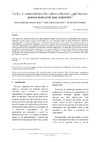Please use this identifier to cite or link to this item:
https://accedacris.ulpgc.es/jspui/handle/10553/70530
| Campo DC | Valor | idioma |
|---|---|---|
| dc.contributor.author | García Cabrera, Antonia Mercedes | en_US |
| dc.contributor.author | García Soto, María Gracia | en_US |
| dc.contributor.author | Dias-Furtado, Jeremias | en_US |
| dc.date.accessioned | 2020-02-26T19:14:03Z | - |
| dc.date.available | 2020-02-26T19:14:03Z | - |
| dc.date.issued | 2018 | en_US |
| dc.identifier.issn | 2530-5603 | en_US |
| dc.identifier.uri | https://accedacris.ulpgc.es/handle/10553/70530 | - |
| dc.description.abstract | ¿Qué factores del entorno generan razones para emprender basadas en motivaciones por oportunidad (buscar riqueza y crecimiento), sociales (ayudar a otros, a la comunidad, etc.) o por necesidad (cuando no existe otra alternativa disponible, medio para lograr sustento económico)? Este trabajo analiza la importancia de las regulaciones vigentes en materia de emprendimiento, el conocimiento disponible y los valores culturales para la generación de estos tres componentes de la motivación emprendedora. Los resultados indican que el conocimiento es el factor más importante. Mientras que la educación favorece la motivación por oportunidad, la existencia de experiencia empresarial en el entorno más cercano del individuo afecta principalmente a la generación de los componentes social y por necesidad de la motivación emprendedora. Las leyes, aunque regulan los incentivos para alentar a crear empresas no logran los resultados a los que aspiran. Los autores alcanzan estas conclusiones tras estudiar una muestra de 93 emprendedores localizados en seis de las diez islas que conforman Cabo Verde, país africano en desarrollo. | en_US |
| dc.description.abstract | What environmental factors generate reasons to be an entrepreneur based on opportunity motivation (i.e., look for growth and earnings), social motivation (i.e., helping others, helping the community, etc.), and necessity motivation (i.e., there is no other available alternative to survive)? This study analyse the relevance of law, knowledge and cultural values in generating the components of entrepreneurial motivation that lead individual to actually set up his/her own business. The results show that knowledge is the most important factor. Whereas education is a relevant issue favouring the opportunity motivation, the existence of business experience in the close environment are most responsible for the emergence of the social and necessity components of entrepreneurial motivation. Laws, albeit regulating incentives to encourage people to create firms do not achieve the expected results. The authors reach this conclusion after studying a sample of 93 entrepreneurs from six of the ten islands that make up the African nation of Cape Verde. | en_US |
| dc.language | spa | en_US |
| dc.relation.ispartof | Emprendimiento y negocios internacionales | en_US |
| dc.source | Emprendimiento y negocios internacionales [ISSN 2530-5603], v. 3 (2), p. 5-15 | en_US |
| dc.subject | 5311 Organización y dirección de empresas | en_US |
| dc.subject.other | Motivación emprendedora | en_US |
| dc.subject.other | Emprendimiento | en_US |
| dc.subject.other | Entorno institucional | en_US |
| dc.subject.other | Nueva teoría institucional | en_US |
| dc.subject.other | Países en desarrollo | en_US |
| dc.subject.other | Entrepreneurial motivation | en_US |
| dc.subject.other | Institutional environment | en_US |
| dc.subject.other | Entrepreneurship | en_US |
| dc.subject.other | New institutional theory | en_US |
| dc.subject.other | Developing economy | en_US |
| dc.title | La ley, el conocimiento o los valores culturales: ¿qué factores generan motivación para emprender? | en_US |
| dc.title.alternative | Law, knowledge and cultural values: What factors generate motivations to be an entrepreneur? | en_US |
| dc.type | info:eu-repo/semantics/article | en_US |
| dc.type | Article | en_US |
| dc.identifier.doi | 10.20420/eni.2019.240 | en_US |
| dc.identifier.issue | 2 | - |
| dc.relation.volume | 3 | - |
| dc.investigacion | Ciencias Sociales y Jurídicas | en_US |
| dc.type2 | Artículo | en_US |
| dc.description.notas | Clasificación JEL: B52, L26, N27, Z32 | en_US |
| dc.utils.revision | Sí | en_US |
| dc.identifier.ulpgc | Sí | es |
| item.fulltext | Con texto completo | - |
| item.grantfulltext | open | - |
| crisitem.author.dept | GIR IUCES: Estrategia y Negocios Internacionales | - |
| crisitem.author.dept | IU de Cibernética, Empresa y Sociedad | - |
| crisitem.author.dept | Departamento de Economía y Dirección de Empresas | - |
| crisitem.author.dept | GIR IUCES: Estrategia y Negocios Internacionales | - |
| crisitem.author.dept | IU de Cibernética, Empresa y Sociedad | - |
| crisitem.author.dept | Departamento de Economía y Dirección de Empresas | - |
| crisitem.author.orcid | 0000-0001-9150-7998 | - |
| crisitem.author.orcid | 0000-0001-5020-8166 | - |
| crisitem.author.parentorg | IU de Cibernética, Empresa y Sociedad | - |
| crisitem.author.parentorg | IU de Cibernética, Empresa y Sociedad | - |
| crisitem.author.fullName | García Cabrera, Antonia Mercedes | - |
| crisitem.author.fullName | García Soto, María Gracia | - |
| Colección: | Artículos | |
Visitas 5
303
actualizado el 10-ene-2026
Descargas
131
actualizado el 10-ene-2026
Google ScholarTM
Verifica
Altmetric
Comparte
Exporta metadatos
Los elementos en ULPGC accedaCRIS están protegidos por derechos de autor con todos los derechos reservados, a menos que se indique lo contrario.
